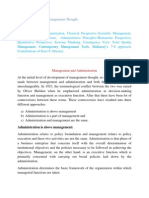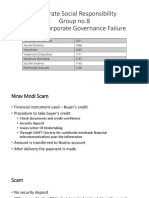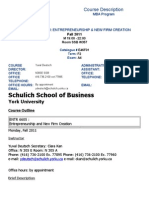0 ratings0% found this document useful (0 votes)
80 viewsKumar Mangalam Birla Committee Report & Recommendations
Kumar Mangalam Birla Committee Report & Recommendations
Uploaded by
ksonaliThe Kumar Mangalam Birla Committee was formed to review corporate governance practices from an investor perspective and develop a code of best practices. The Committee made 25 recommendations, 19 of which were mandatory. The key recommendations included having an independent board with at least 50% independent directors, establishing audit and remuneration committees, and increasing disclosure standards around director compensation. The goal was to promote high standards of governance and protect shareholder interests.
Copyright:
Attribution Non-Commercial (BY-NC)
Available Formats
Download as PPTX, PDF, TXT or read online from Scribd
Kumar Mangalam Birla Committee Report & Recommendations
Kumar Mangalam Birla Committee Report & Recommendations
Uploaded by
ksonali0 ratings0% found this document useful (0 votes)
80 views7 pagesThe Kumar Mangalam Birla Committee was formed to review corporate governance practices from an investor perspective and develop a code of best practices. The Committee made 25 recommendations, 19 of which were mandatory. The key recommendations included having an independent board with at least 50% independent directors, establishing audit and remuneration committees, and increasing disclosure standards around director compensation. The goal was to promote high standards of governance and protect shareholder interests.
Original Title
KMB Report
Copyright
© Attribution Non-Commercial (BY-NC)
Available Formats
PPTX, PDF, TXT or read online from Scribd
Share this document
Did you find this document useful?
Is this content inappropriate?
The Kumar Mangalam Birla Committee was formed to review corporate governance practices from an investor perspective and develop a code of best practices. The Committee made 25 recommendations, 19 of which were mandatory. The key recommendations included having an independent board with at least 50% independent directors, establishing audit and remuneration committees, and increasing disclosure standards around director compensation. The goal was to promote high standards of governance and protect shareholder interests.
Copyright:
Attribution Non-Commercial (BY-NC)
Available Formats
Download as PPTX, PDF, TXT or read online from Scribd
Download as pptx, pdf, or txt
0 ratings0% found this document useful (0 votes)
80 views7 pagesKumar Mangalam Birla Committee Report & Recommendations
Kumar Mangalam Birla Committee Report & Recommendations
Uploaded by
ksonaliThe Kumar Mangalam Birla Committee was formed to review corporate governance practices from an investor perspective and develop a code of best practices. The Committee made 25 recommendations, 19 of which were mandatory. The key recommendations included having an independent board with at least 50% independent directors, establishing audit and remuneration committees, and increasing disclosure standards around director compensation. The goal was to promote high standards of governance and protect shareholder interests.
Copyright:
Attribution Non-Commercial (BY-NC)
Available Formats
Download as PPTX, PDF, TXT or read online from Scribd
Download as pptx, pdf, or txt
You are on page 1of 7
Kumar Mangalam Birla Committee
Report & Recommendations
To view corporate governance from the point of
view of investors and shareholders, to prepare a
code to suit the corporate environment.
Outcome
• The Committee made 25 recommendations,
19 of them were `mandatory
• To promote and raise the standards of
corporate governance.
• Aplies to listed companies of paid up capital of
Rs. 3 crores .
Recommendations
• Composition of Board of Directors
Distinction between non-executive directors, independent and
non-independent ones.
Independence: Independent directors have only the income
from the director’s remuneration. They do not have any other
relationship with company or its promoters, management or
its subsidiaries.
All pecuniary relationships of non-executive directors be
disclosed in the annual report
Recommendations Contd…
• Independent and non-independent directors should help
bring an independent judge to bear on boards deliberations
especially on issues of strategy, performance, management of
conflicts and standards of conduct.
• Optimum combination of independent and non-independent
board of directors, not less than 50 percent independent.
• Incase of Non-executive chairman- 1/3rd board have
independent directors
• Executive chairman: Half the board be independent
Contd…
• Non executive chairman- Entitled to maintain chairman’s
office at company’s expense
• Reimbursement of expenses incurred in performing duties, to
discharge functions effectively
• This is a non mandatory recommendation
Contd..
• Audit Committee- With 3 independent directors, with 1
having financial and accounting knowledge.
• Remuneration committee – Disclosure in annual report
relating to all elements of remuneration package of directors
like salary, bonus, ESOPs, pension, benefits etc.
Remarks
• By and large, Indian listed companies have been legally
mandated to follow fairly strict standards of corporate
governance and disclosure.
• Indian corporate sector regulators and companies have been
quick to incorporate some of the best international corporate
governance and disclosure practices
• The need of the day is more training… of directors, audit
committee members and senior executives of companies
• The challenge is to design and sustain a system that imbibes
the spirit of corporate governance… and not merely the letter
of the law
You might also like
- Detailed Lesson Plan On EconomicsDocument6 pagesDetailed Lesson Plan On EconomicsArchill Yapparcon92% (26)
- 5 - Corporate Governance AmendedDocument24 pages5 - Corporate Governance AmendednurhoneyzNo ratings yet
- Su580 1404en FDocument5 pagesSu580 1404en FDaniel Camilo Granados FlórezNo ratings yet
- Banking Sector: Developments, Challenges and OpportunitiesDocument8 pagesBanking Sector: Developments, Challenges and OpportunitiesAdeel AmeerNo ratings yet
- Business CommunicationDocument15 pagesBusiness CommunicationBibin FrancisNo ratings yet
- Cloud Computing in Distributed System IJERTV1IS10199Document8 pagesCloud Computing in Distributed System IJERTV1IS10199Nebula OriomNo ratings yet
- Operating SystemDocument16 pagesOperating SystemMind ControlNo ratings yet
- Hardware and SoftwareDocument7 pagesHardware and SoftwareShea BansalNo ratings yet
- Topology and Its TypeDocument4 pagesTopology and Its TypeNEHA CHAHARNo ratings yet
- Principles of LendingDocument2 pagesPrinciples of LendingWaqas TariqNo ratings yet
- What Is Word ProcessingDocument7 pagesWhat Is Word ProcessingPie MallariNo ratings yet
- GD TipsDocument10 pagesGD TipsjukyiNo ratings yet
- Stakeholders and Corporate GovernanceDocument29 pagesStakeholders and Corporate GovernanceNairita ChakrabartyNo ratings yet
- Role of Auditor in Corporate GovernanceDocument7 pagesRole of Auditor in Corporate GovernancePrashant Singh RajputNo ratings yet
- Structure and Functions of Reserve Bank of IndiaDocument24 pagesStructure and Functions of Reserve Bank of Indiasridevi gopalakrishnanNo ratings yet
- DBMS UNIT-I Notes (Added Key Concept)Document51 pagesDBMS UNIT-I Notes (Added Key Concept)helloNo ratings yet
- Corporate Governance MechanismsDocument16 pagesCorporate Governance MechanismsNthambi MiriamNo ratings yet
- Capital Structure TheoriesDocument9 pagesCapital Structure TheoriesMahesh HadapadNo ratings yet
- Indian Banking SystemDocument25 pagesIndian Banking SystemTajinder JassalNo ratings yet
- Challenges Before Indian Commercial BanksDocument3 pagesChallenges Before Indian Commercial BanksAnirban Purkait100% (1)
- Sources of Finance FinanceDocument10 pagesSources of Finance FinanceNitin PariharNo ratings yet
- NPA ManagementDocument18 pagesNPA ManagementVincy LuthraNo ratings yet
- Companies Act, 2013 NotesDocument53 pagesCompanies Act, 2013 NotesJagmohan SainiNo ratings yet
- Tandon CommitteeDocument6 pagesTandon CommitteeSakthi Priyadharshini MNo ratings yet
- Bank and Types of BanksDocument9 pagesBank and Types of BanksreshNo ratings yet
- Chapter 1. Introduction To The Analysis of Financial Statements. SlidesDocument32 pagesChapter 1. Introduction To The Analysis of Financial Statements. SlidesElizaPopescuNo ratings yet
- Becg Unit-4.Document12 pagesBecg Unit-4.Bhaskaran Balamurali100% (2)
- Corporate Governance in India - Past, Present & Future by Sonali Soni: Top Prize Winning Article - IDocument10 pagesCorporate Governance in India - Past, Present & Future by Sonali Soni: Top Prize Winning Article - IarmaanNo ratings yet
- "General Banking in Bangladesh" - A Study Based On First Security Islami Bank Ltd.Document53 pages"General Banking in Bangladesh" - A Study Based On First Security Islami Bank Ltd.SharifMahmudNo ratings yet
- Client Server OS Model (Part 1)Document2 pagesClient Server OS Model (Part 1)GeorgePapaloukasNo ratings yet
- Human Resource Information Systems (HRIS) in HR Planning and Development in Mid To Large Sized OrganizationsDocument7 pagesHuman Resource Information Systems (HRIS) in HR Planning and Development in Mid To Large Sized OrganizationshanggarajNo ratings yet
- Explain The Rationale For The Nationalization of BanksDocument13 pagesExplain The Rationale For The Nationalization of Bankssanjay parmarNo ratings yet
- BBA VI Semester: Business and SocietyDocument17 pagesBBA VI Semester: Business and SocietyBCom HonsNo ratings yet
- Distributed File SystemDocument27 pagesDistributed File SystemAnoushka RaoNo ratings yet
- Derivatives: Introduction To Derivatives: Meaning, Types, Uses and ClassificationDocument17 pagesDerivatives: Introduction To Derivatives: Meaning, Types, Uses and ClassificationAlok PandeyNo ratings yet
- Cash Management ServicesDocument5 pagesCash Management ServicesMadhur AnandNo ratings yet
- Business CommunicationDocument16 pagesBusiness Communicationsonalika patelNo ratings yet
- Business Accountancy Module 1Document49 pagesBusiness Accountancy Module 1Yolo Guy100% (1)
- Overview of C LanguageDocument29 pagesOverview of C Languagevishal yadavNo ratings yet
- Credit RatingDocument42 pagesCredit Ratingshivakumar N100% (3)
- NSDL Case StudyDocument3 pagesNSDL Case StudyDeepshikha Goel100% (1)
- Financial Statement AnalysisDocument39 pagesFinancial Statement AnalysisunnijadejaNo ratings yet
- CodaDocument25 pagesCodacreetiNo ratings yet
- Role and Responsibilities of Independent DirectorsDocument31 pagesRole and Responsibilities of Independent DirectorsLavina ChandwaniNo ratings yet
- Financial Services Unit-1Document33 pagesFinancial Services Unit-1Feeroj PathanNo ratings yet
- Corporate Governance Part 1Document18 pagesCorporate Governance Part 1Jam LegaspiNo ratings yet
- Management of Financial ServicesDocument7 pagesManagement of Financial ServicesKajal Bhammar100% (1)
- Difference Between Systematic and Unsystematic RiskDocument6 pagesDifference Between Systematic and Unsystematic RiskIan GolezNo ratings yet
- Module 3 Banker & CustomerDocument33 pagesModule 3 Banker & CustomerSumiya YousefNo ratings yet
- Cost of CapitalDocument20 pagesCost of CapitalGagan RajpootNo ratings yet
- Legal Aspects of LeasingDocument1 pageLegal Aspects of LeasingredsaluteNo ratings yet
- PPM-Notes-Unit II-Evolution of Management ThoughtDocument23 pagesPPM-Notes-Unit II-Evolution of Management ThoughtNilabjo Kanti PaulNo ratings yet
- On Banking Sector For PresentationDocument23 pagesOn Banking Sector For Presentationvaishali haritNo ratings yet
- The Information Systems Revolution Transforming Business and ManagementDocument40 pagesThe Information Systems Revolution Transforming Business and ManagementUtkarsh SethiNo ratings yet
- Traditional Functions of RBIDocument3 pagesTraditional Functions of RBIomkarmbaNo ratings yet
- The Role of Stakeholders in Corporate GovernanceDocument3 pagesThe Role of Stakeholders in Corporate GovernanceCunanan, Malakhai JeuNo ratings yet
- (Short Term Financing) : Trade CreditDocument11 pages(Short Term Financing) : Trade CreditpRiNcE DuDhAtRaNo ratings yet
- Winding Up of CompanyDocument24 pagesWinding Up of CompanyKaran Veer Singh100% (1)
- Cadbury ReportDocument11 pagesCadbury ReportPolash HossainNo ratings yet
- Nirav Modi ScamDocument16 pagesNirav Modi ScamAbhishek ChoudharyNo ratings yet
- Effective Corporate Governance-KajariDocument116 pagesEffective Corporate Governance-Kajarisonam1992No ratings yet
- Presented by Group 3Document23 pagesPresented by Group 3Aishwarya ShettyNo ratings yet
- Mumbai DabbawalasDocument14 pagesMumbai DabbawalasRaghav MaheshwariNo ratings yet
- Probability Concept and Application (Exercise Answer)Document14 pagesProbability Concept and Application (Exercise Answer)LokaNo ratings yet
- Crude Oil Exports by Country 2020Document8 pagesCrude Oil Exports by Country 2020Bonnie DebbarmaNo ratings yet
- BTOT MCQ Merged 1Document13 pagesBTOT MCQ Merged 1BalasubramanianNo ratings yet
- CMA Inventory Management New HandoutDocument10 pagesCMA Inventory Management New HandoutahmedNo ratings yet
- HSBC at Risk of Legal Action Over Swiss Tax Dodge Claims: Humour Failure Gideon Rachman What's Yahoo's Thing?Document30 pagesHSBC at Risk of Legal Action Over Swiss Tax Dodge Claims: Humour Failure Gideon Rachman What's Yahoo's Thing?stefanoNo ratings yet
- Schulich School of Business: Course DescriptionDocument10 pagesSchulich School of Business: Course DescriptionRashmi Ranjan MohantyNo ratings yet
- Ispolec NotesDocument132 pagesIspolec NotesisaacarmogeniaNo ratings yet
- P2P Acc. Entries With & Without EncumbranceDocument7 pagesP2P Acc. Entries With & Without EncumbranceRBalajiNo ratings yet
- CaseDocument2 pagesCaseLester Sanchez100% (1)
- Contemporary Management Issues: Student ID: Submission Deadline Word Count: 4000Document15 pagesContemporary Management Issues: Student ID: Submission Deadline Word Count: 4000Rafia PervaizNo ratings yet
- Ind AS 116Document13 pagesInd AS 116Akhil KhandelwalNo ratings yet
- Bakeries Industry SnapshotDocument7 pagesBakeries Industry SnapshotAdil AnwarNo ratings yet
- Abs Solution V CardDocument1 pageAbs Solution V CardDʌʀĸ Hʋŋtɘʀ AvijitNo ratings yet
- Essentials of HRM AssignmentDocument9 pagesEssentials of HRM AssignmentShivani MallikNo ratings yet
- ROCE Growth Matrix - SNDocument6 pagesROCE Growth Matrix - SNFESCRIBDNo ratings yet
- General Mathematics: Quarter 2 - Module 3: Solving Problems Involving Simple and Compound InterestDocument36 pagesGeneral Mathematics: Quarter 2 - Module 3: Solving Problems Involving Simple and Compound Interestdyevelyn19No ratings yet
- University of Kerala: Syllabus For Iii Semester Computer Science & EngineeringDocument21 pagesUniversity of Kerala: Syllabus For Iii Semester Computer Science & EngineeringVishnuNo ratings yet
- Finals Exam On Cost Accounting - Set ADocument3 pagesFinals Exam On Cost Accounting - Set ADe Chavez May Ann M.No ratings yet
- Report On Importance of Strategic Decision Making and Its Steps in IBBLDocument10 pagesReport On Importance of Strategic Decision Making and Its Steps in IBBLShahed HossainNo ratings yet
- Annex F RR 11-2018Document1 pageAnnex F RR 11-2018reneth davidNo ratings yet
- Preweek Auditing Problems 2014 PDFDocument41 pagesPreweek Auditing Problems 2014 PDFalellieNo ratings yet
- Commodity Exchange: Lakshminarayanan Alaguraja Advocate Altacit GlobalDocument18 pagesCommodity Exchange: Lakshminarayanan Alaguraja Advocate Altacit GlobalHarvinder Singh DuttaNo ratings yet
- Article-C S VermaDocument3 pagesArticle-C S VermaSaraswatiNo ratings yet
- Worldwide Paper Cworldwide Company FinalDocument4 pagesWorldwide Paper Cworldwide Company FinalNoor Ji100% (2)
- Bmc-section13-Group2 - Hangelica Harold SinpongDocument14 pagesBmc-section13-Group2 - Hangelica Harold SinpongMUHAMMAD ALIF AIMAN BIN AZLAN BA21110434No ratings yet
- Presented By-:: Neelesh Shrivastava Nikhil Sood Nitin Malik Omansh Bhardwaj Mohd ArmanDocument30 pagesPresented By-:: Neelesh Shrivastava Nikhil Sood Nitin Malik Omansh Bhardwaj Mohd ArmanARMAN PILOTNo ratings yet
- Profit From Time (1997)Document291 pagesProfit From Time (1997)DANNo ratings yet

























































































